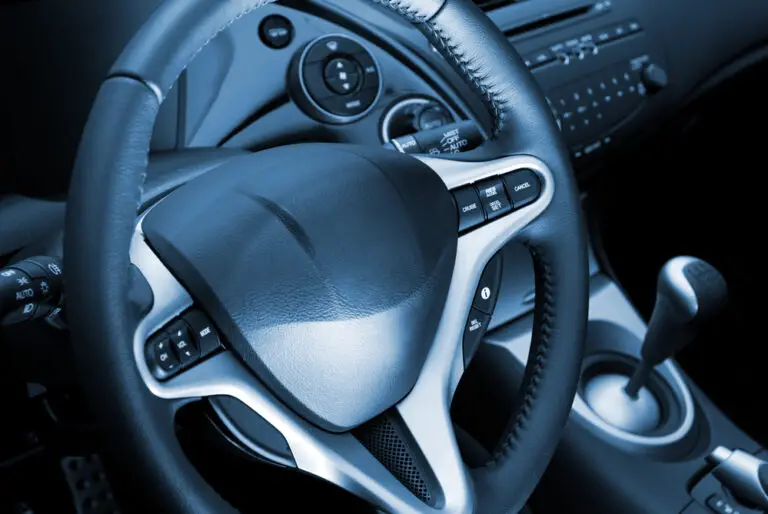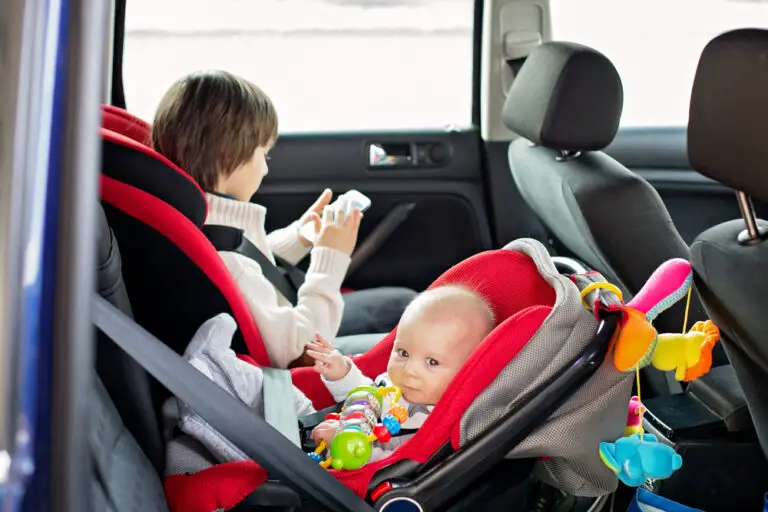South Carolina Car Seat Laws 2024 (Rear, Forward & Booster)

Under South Carolina car seat laws, a child passenger under 8 years of age must be secured in a rear-facing, forward-facing, or booster seat as prescribed by the law. The driver is responsible for ensuring that the child is properly secured. There is a maximum fine of $150 for violating the law.
Disclaimer: This content does not constitute legal advice. It is solely for informational purposes. Always check the original source of the law for the latest version.
- Rear-Facing
- Forward-Facing
- Booster
- Front Seat
- Seat Belt
- Taxi Seat
- Ridesharing Seat
- Replacement
- Alone in Car
- Choosing a Seat
- Installation Help
South Carolina Car Seat Laws
South Carolina Rear-Facing Car Seat Law
According to the rear-facing car seat law in South Carolina, an infant under 2 years of age must be placed in a rear-facing seat in the back set of the vehicle. (1)
Though the rear-facing car seat age in South Carolina is 2 years, children should continue riding rear-facing until they exceed the height or weight limit of the car seat as prescribed by the manufacturer. The driver has to ensure that the child is properly secured. A violation of the law can result in a maximum fine of $150.
A child who cannot be secured in a rear-facing seat due to a medical condition is exempt from South Carolina rear-facing child seat law. The reasons have to be substantiated with a written statement from the child’s doctor, advanced nurse practitioner, or physician assistant.
Age: Newborn to 2 years
Penalty: Maximum $150
South Carolina Forward-Facing Car Seat Law
According to the forward-facing car seat law in South Carolina, a child who is at least 2 years old or a child younger than 2 years who has outgrown their rear-facing seat has to ride in a forward-facing car seat. (1) The seat must have a harness and be placed in the backseat of the vehicle.
The forward-facing car seat age in South Carolina is 2 years. Children should ride forward-facing till they exceed the height and weight limits of the seat. Those who cannot use a car seat due to a medical condition have to carry a written statement from the doctor, advanced nurse practitioner, or physician assistant.
Any violation of South Carolina forward-facing child seat law can result in a maximum fine of $150 for the driver of the vehicle.
Age: 2+ years
Penalty: Maximum $150
South Carolina Booster Seat Law
According to the child booster seat law in South Carolina, a child at least 4 years of age who has outgrown their forward-facing seat must be secured in a belt-positioning booster seat. (1) It must be placed in the backseat of the vehicle. Those children who cannot ride in a booster seat are exempt.
The seat can be a high back or backless booster seat. It must be secured with both lap and shoulder belts. The booster seat age in South Carolina is 4 years. Children who have outgrown the height and weight limits of their forward-facing seats can ride in booster seats.
The driver is responsible for observing South Carolina booster seat requirements. A violation of the law can lead to a maximum fine of $150.
Age: 4+ years
Height: Less than 57 inches
Penalty: Maximum $150
South Carolina Child Front Seat Law
According to the child front seat law in South Carolina, a child can sit in the front seat if the vehicle does not have a rear passenger seat or all the rear seating positions are occupied by children under 8 years of age. (1)
The child in the front seat must be secured in an appropriate car seat according to the height and weight requirements. Any violation will attract a maximum penalty of $150. When traveling with a rear-facing seat in the front seat, the passenger side airbag must be deactivated.
An express front seat age in South Carolina is absent. As per the South Carolina Department of Health and Environmental Control, children under 13 years of age should ride in the backseat. (2) This is based on the recommendations of the American Academy of Pediatrics (AAP).
Age: 13+ years (recommended)
Penalty: Maximum $150
South Carolina Child Seat Belt Law
According to the child seat belt law in South Carolina, a child who is at least 8 years old or at least 57 inches tall can use an adult safety belt. (1) The lap and shoulder belts must fit properly across the child’s thighs, hips, and chest. These requirements apply regardless of whether they are in the backseat or the front seat.
The South Carolina children’s seat belt law does not apply to children who are unable to wear seat belts due to a medical or physical condition.
The driver will be responsible if a child is not wearing a seat belt. Any violation of the seat belt rules in South Carolina will result in a penalty that can go up to a maximum of $150.
Age: 8+ years
Height: At least 57 inches
Penalty: Maximum $150
South Carolina Taxi Child Seat Law
According to the taxi child seat law in South Carolina, taxis are exempt from complying with South Carolina car seat regulations. (1) The taxi driver is not responsible for providing a taxi child seat in South Carolina.
However, if you are traveling with a child passenger who is under 8 years of age, it is best to arrange a car seat or carry your own. It must be appropriate for the child’s age and weight. It can be a rear-facing, forward-facing, booster, or all-in-one seat.
When installing the car seat in a taxi, it is your responsibility as a caregiver to ensure that it is securely fixed. You can ask the driver to help you safely install the seat according to the manufacturer’s instructions.
South Carolina Ridesharing Child Seat Law
There is no clear ridesharing child seat law in South Carolina. The child seat requirements in South Carolina mandate that kids younger than 8 years must be placed in the prescribed car seat. (1) But there is no mention of ridesharing services.
The responsibility of ensuring that children are safely secured rests with the driver of the motor vehicle. While South Carolina state law explicitly exempts taxi drivers, it does not mention rideshare services.
However, it does differentiate between taxis and a ‘transportation network company’. (3) Services such as Uber or Lyft fall under ‘transportation network company’ and hence cannot claim the exemption.
The best option, in this case, is for either the driver or the parents/caregivers to provide a child seat. It must be appropriate for the child’s age and weight and meet federal safety standards.
South Carolina Child Seat Replacement Law
There is no particular child seat replacement law in South Carolina. In this case, it is best to refer to the NHTSA recommendations.
A child safety seat must be replaced after a moderate or severe accident in South Carolina. It may have defects that are not visible to the naked eye. In case of a low-impact accident, there is no urgent need to replace the car seat.
A low impact crash is where no passenger is injured, the door nearest to the car seat is not damaged and the seat itself shows no visible damage.
Apart from replacing the seat after child seat replacement after an accident, you must also replace it after it has expired according to the manufacturer’s label or been recalled.
Leaving Child in the Car in South Carolina
Currently, there is no law on leaving a child in a vehicle in South Carolina. However, leaving a child unattended in a vehicle is extremely dangerous. The most common danger is heat stroke.
The temperature inside the vehicle can rise rapidly in a short time. Since children’s bodies heat up 3 to 5 times faster than adults, they are at great risk of suffering a heat stroke. The child can also suffer an in-car accident or set the car in motion.
While there is no specific law about leaving a child in the car in South Carolina, the offender may be charged with unlawful conduct towards a child by placing the child at an unreasonable risk of harm that affects their life or safety.
Choosing a Child Car Seat in South Carolina
When choosing a car seat in South Carolina, you must refer to the car seat laws in South Carolina to get the prescribed seat for your child.
From the time your child is born till they turn at least 2 years old, a rear-facing car seat is the best car seat to use in South Carolina. They can then move to a forward-facing seat.
After they outgrow these, they should use booster seats. A high-back or backless seat is the best booster seat to use in South Carolina.
Whichever car seat you choose, it must meet federal safety standards.
Car Seat Installation Help in South Carolina
Child passenger safety seats in South Carolina must be secured perfectly to ensure the safety of your child. It can be a complex task to correctly install the car seats.
But there are different stations in South Carolina that have certified Child Passenger Safety (CPS) technicians. You can get your car seat checked or installed and also learn more about child passenger safety. Some of these are:
- South Carolina Department of Health & Environmental Control (SafeKids South Carolina)
- York County, South Carolina
- Charleston Fire Department
- City of Greer Fire Department
- Spartanburg Medical Center
- Hilton Head Island Fire Rescue Headquarters
- Sumter Fire Department
South Carolina Car Seat Safety Resources
- South Carolina Department of Public Safety: The official website of the department contains tips on how to choose a car seat, how to install it and how to position the harness correctly.
- S.C. Department of Health and Environmental Control: The Child Passenger Safety Program of the department provides vital resources such as proper installation of car seats, counseling of parents and caregivers and safety tips from the NHTSA and AAP.
- Clemson University Child Passenger Safety Program: The program is initiated by Clemson University, a leading public research institution in South Carolina. It works with government departments and provides important tips on child passenger restraint.
FAQ
How long should a child ride in a rear-facing car seat in South Carolina?
As per South Carolina child seat laws, a child should ride in a rear-facing car seat till the age of 2 years or till they outgrow the rear-facing seat.
Can you put a rear-facing car seat in the front seat in South Carolina?
No, a rear-facing seat must be placed in the backseat. The only exception is if the vehicle does not have a rear seat or all rear seating positions are occupied by children under 8 years old.
Can you put a rear-facing car seat in the middle rear seat in South Carolina?
You can put a rear-facing car seat in the middle rear seat, but it must fit properly. Check the car seat as well as your vehicle’s manuals.
When can a baby face forward in a car seat in South Carolina?
A child can face forward after they have outgrown their rear-facing seat or when they are at least 2 years old.
How old for a booster seat in South Carolina?
A child who is at least 4 years old can ride in a booster seat. Those children who have outgrown their forward-facing seat can also ride in a booster.
When to use a backless booster seat in South Carolina?
You can use a backless booster seat if your vehicle seat has a headrest and the child’s ears are not higher than the seat back.
When can a child sit in the front seat with a booster in South Carolina?
A child can sit in the front seat with a booster if the vehicle does not have a backseat or all seating positions at the back are occupied by children under 8 years of age.
When can a child stop using a booster seat in South Carolina?
A child can stop using a booster seat when they turn 8 years old or are at least 57 inches in height. They can then start using the seatbelt.
When can a child sit in the front seat in South Carolina?
Ideally, a child should sit in the front seat after they turn 13 years old. But they can also sit in front if the vehicle does not have a backseat.
When to switch from 5 point harness to a seat belt in South Carolina?
When the child outgrows the height and weight limits of the 5-point harness, they can switch to wearing a seat belt in a booster seat.
When can a child use a regular seat belt in South Carolina?
Under the law, a child can start using a regular seat belt once they are 8 years old or are at least 57 inches tall.
Do you need a car seat in a taxi in South Carolina?
Taxis in South Carolina are exempt from having a car seat. The driver is not responsible for carrying one. But it is best for the parent/caregiver to have a car seat in a taxi.
Do you need a car seat in a Uber in South Carolina?
The law is silent on this issue. But either the caregiver or the driver should provide a federally approved car seat that is appropriate for the child’s age and weight.
Do you need a car seat in a Lyft in South Carolina?
The law is not clear on this issue. But either the caregiver or the driver should provide an appropriate car seat to ensure the child’s safety.

Rishima Rawat
Rishima Rawat is a lawyer and legal writer with over six years of writing and legal experience. She earned her LLB degree from the West Bengal National University of Juridical Sciences, Kolkata. With a passion for child safety, she’s written extensively about the U.S. car seat laws in ParentingMode. She collaborates with businesses and law firms globally, enhancing their online content. Her insights are also published in legal journals like RGNUL, NLIU, and RMLNLU Law Review. Committed to the cause of education, she has volunteered with IDIA, which helps underprivileged children in India to access legal education. She has also worked with Enhelion Knowledge Ventures, a leading legal ed-tech platform in India that provides students with affordable courses in law. Fluent in English and Hindi with elementary proficiency in Spanish, Rishima combines her legal expertise with a dedication to child safety.






